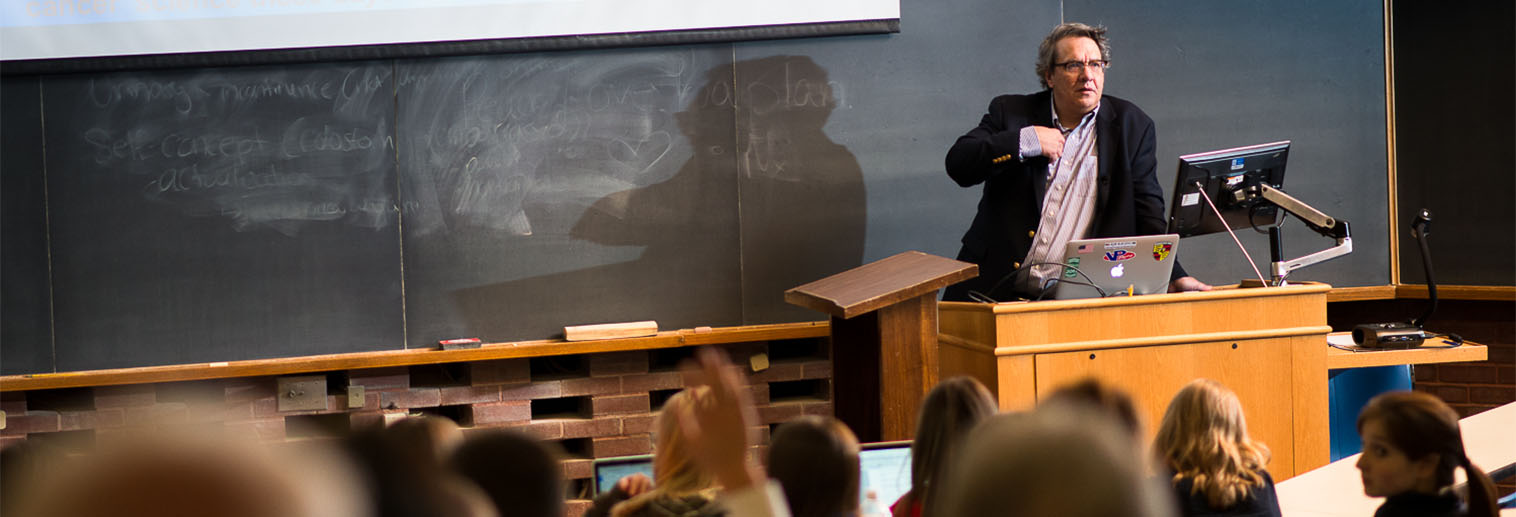On the Front Lines of the Cancer War
Frank Rauscher III' 79, Deputy Director of the Wistar Institute, is fighting cancer with the latest research tools and scientific understanding, and he brings us up-to-date on the status of that fight as the Obama administration makes a new committment to the war on cancer.
Forty-five years ago, President Nixon appointed Frank Rauscher Jr., a 1953 graduate of Moravian University, director of the National Cancer Institute (NCI) and the lead on the war on cancer. Today his son Frank Rauscher III ’79 stands on the front lines of a renewed war on cancer--the National Cancer Moonshot, announced by President Obama in his final State of the Union address in January, and to be overseen by Vice President Joe Biden, who lost his son Beau to brain cancer last year.
Rauscher is Deputy Director of the Wistar Institute, the nation’s first independent biomedical research facility and an NCI-Designated Cancer Center. He is also a Caspar Wistar Professor, Founder of The Gene Expression and Regulation Program, and holds a joint appointment in the Department of Genetics at the University of Pennsylvania. Rauscher came to campus on April 14 to share his observations about the history and progress we’ve made in fighting this disease in his presentation “Renewing the War on Cancer in The Post Genomic and Personalized Medicine Era.”
A self-described Forrest Gump of cancer research, Rauscher has seen it unfold from the beginning—the events, leadership, politics, and personalities. He describes the first federal foray into research as a race to the beginning of the road. “There were no tools, no models, and the surgeries and chemotherapy were barbaric,” says Rauscher who recalls from his undergraduate years at Moravian University, a January term spent studying at Yale where he observed chemotherapy treatments so toxic “people’s eyes turned purple.”
He explains that back in the 70’s scientists believed that cancer was caused either by a virus or exposure to chemical carcinogens. As it turns out, viruses cause almost no cancers. and chemical carcinogenesis became the mainstay of research for years.
The most important finding of the first war on cancer was the discovery of the oncogene—a gene that when mutated causes cancer—and this led to increasing focus over the years on those mutated genes and how to target them and alter or inhibit their function. Scientists’ ability to do gene sequencing suggests the potential to develop a personalized treatment for cancer by doing genomic sequencing of a tumor and then applying a chemotherapy targeted to the specific gene mutations discovered. Rauscher’s work at the Wistar Institute, as stated on the Institute’s website, “seeks to define the biochemical and molecular mechanisms that govern the normal silencing of genes during development and homeostasis, as well as disruptions of these governing mechanisms during tumor initiation and progression.”
The National Cancer Moonshot initiative has pledged $1 billion over the next 10 years and begins immediately with $195 million directed to the NIH this year and $755 million budgeted for the 2017 fiscal year to fund advancements in the following areas
- Early detection
- Immuno-oncology--drug treatment that boosts your immune system’s ability to fight cancers
- Pediatric cancers
- Cancer vaccines
- The genomic profiling of tumors
- Data sharing
Rauscher believes there will be lots of political wrangling over the Moonshot goals and practices and that funding will be incremental. The initiative might be “another blip in the road,” but he is optimistic overall about humanity’s odds in the war against cancer. We’ve learned so much and moved forward so rapidly in our understanding of cancer, how it happens, the genetics involved, and while the original war on campus turned out to be a race to the beginning. This renewed battle will be a race to the end.
And a happy ending at that.

